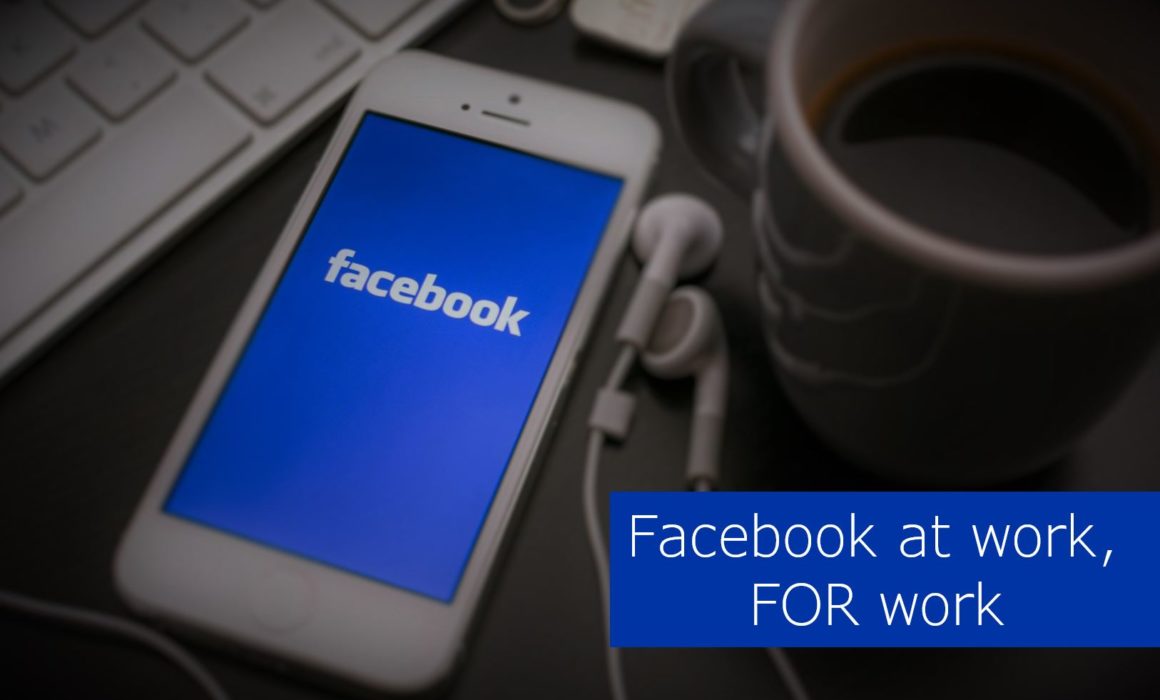Facebook at work, for work
You may or may not know that over the past year, Facebook have been working to determine how the platform can be used in a work capacity – via its news feeds, groups, and messaging. If you look at Facebook you’ll find there’s now a separate page login, a separate mobile app, and a Messenger app for your work. If you’ve not seen it, take a look at the link here.
At first we wondered whether Facebook’s end game was about creating a real competitor against the formidable force of LinkedIn, currently valued at 26 billion dollars, but now it appears the plans are considerably more ambitious. Instead of aiming to create a direct LinkedIn competitor per se, Facebook appear to be planning to encourage businesses to use their social graph technology in-house. This Facebook mindshift will enable employees to communicate with one another at work, leaders to interact with business partners – and will even enable the forging of new business relationships via the power of shared contacts.
The list of possibilities becomes endless if you consider how new Facebook for Work apps might be created by an organisation using Facebook’s APIs
With an existing Facebook user base of 1.6 billion people, the interface is certainly already usable, and it would appear to be fairly easy to migrate its user base and start using it to share information about everyday work activities. Facebook’s recent move to encourage Facebook Pages for businesses, along with the launch of tools to create intelligent chat bots to encourage direct customer communication via Facebook Messenger, would appear to fit perfectly into such a strategy.
It doesn’t take a giant leap of imagination to see how employees might be invited to meetings through Facebook Events, how they might create a Facebook Page for a particular project or team, brainstorm creative ideas or see notifications about project progress. Add to this the use of Facebook Messenger video conferencing, or quick-fire response text questions whilst on the move. The list of possibilities becomes endless if you consider how new Facebook for Work apps might be created by an organisation using Facebook’s APIs. As with the regular Facebook, privacy settings could be used in companies to create sub-groups, private pages, groups, and events, sharing this information selectively and confidentially.
It’s easy to imagine how an employee might receive a notification telling them they’ve just been paid or maybe have a holiday request granted (cue Facebook ad recommending all inclusive trip to the Maldives)
And just imagine if all that new information were made available for a company centrally, to search through, to analyse, and to act upon – like a continuous feed of invaluable in-house data. Facebook and Twitter call this ‘firehose’ access. Analyses could be run centrally for all manner of tasks, and Facebook have produced a White Paper on security and how they plan to look after your data. This programme of work is being taken very seriously, and for good reason as security will be a defining factor.
How are third-party apps going to get in on the action?
The likes of Salesforce or Dropbox could fit snugly into a user’s profile page on Facebook for Work, with their existing work applications that make use of Facebook Connect technology and allow employees to log in using their Facebook for Work account. It’s easy to imagine how an employee might receive a notification telling them they’ve just been paid or maybe have a holiday request granted (cue Facebook ad recommending all inclusive trip to the Maldives).
So what if Facebook’s ambitions are far greater than creating an elaborate LinkedIn? Are they planning to offer their own integrated native services? It’s quite possible there is an ambition to compete with a whole bunch of existing business services, from Shutterstock to Mailchimp – and why not? They could even enable an asymmetrical social graph and compete with Twitter. There are a wealth of possibilities including the creation of an employment portal for employers’ recruiters to span across organisations, a bit like LinkedIn, enabling recommendations from existing employees and employees in different organisations. You get the idea.
So what does the future look like?
If you sign up for Facebook for Work, we expect you to see an alarmingly pertinent newsfeed – ultimately with B2B adverts related to your work, job ads to tempt you away from your place of work, and sundry business opportunities that suit your very particular demographic. Let’s face it, where best to advertise if you can target seniors in an organisation who have the authority to buy products and services? We’re also predicting that Facebook will create a commercial app ecosystem through their APIs – almost adopting an Operating System approach and encouraging integration from all manner of third-party and popular services. Importantly, all these interactions will be quintessentially social, shareable, collaborative – and accessible.
It wouldn’t be so unusual for Facebook to target the business market after its global success in dominating the social graph, especially when you consider that enterprise software spend last year was estimated by Gartner to be $344bn. Microsoft has recently purchased Yammer for $1.2bn to enable collaborative working via a social networking infrastructure – and Slack is relatively new on the market but its chat tool is already popular in project management and software engineering management and is pliable for bespoke development.
Facebook is already piloting the technology with large companies like Heineken and the Royal Bank of Scotland, and they’re still accepting pilots, so we’re excited to see the results – perhaps especially so because Facebook for Work is being developed in London.
Now, Facebook for Dating? Watch this space…

